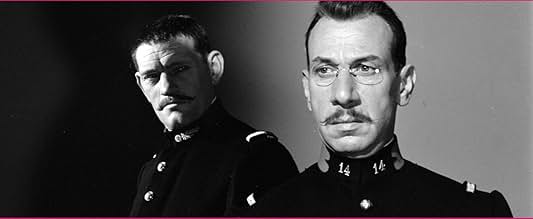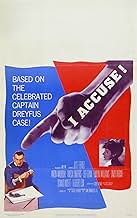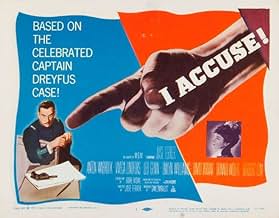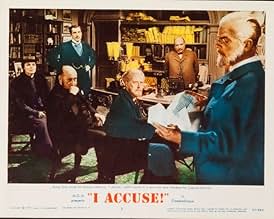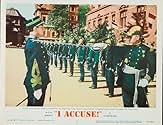VALUTAZIONE IMDb
7,2/10
792
LA TUA VALUTAZIONE
Aggiungi una trama nella tua linguaIn 1894 France, a Jewish officer in the French Army is falsely accused of spying for Germany.In 1894 France, a Jewish officer in the French Army is falsely accused of spying for Germany.In 1894 France, a Jewish officer in the French Army is falsely accused of spying for Germany.
José Ferrer
- Captain Dreyfus
- (as Jose Ferrer)
Recensioni in evidenza
Jose Ferrer was indubitably intelligent and impeccably liberal, as he was sure to let you know. He made a number of rather good movies, but he was not as brilliant as he thought, and his lack of the conventional movie virtues such as charm, sex appeal, or just friendly warmth was far more damaging than he knew.
This movie presents the story clearly and fairly, and there are some good performances, but on the whole it's very cold and dry.
Gore Vidal's script is also intelligent and, rarely for Hollywood historical films, does not contain a single vulgarism or anachronism. But, again, a few of these would be a small price to pay for some zest and passion. A more surprising omission is wit, which one would have expected from Vidal.
And there is another omission. The Dreyfus case was an indication of the degree of anti-semitism among the French as a whole, not only the military. The hatred of Jews that the case provided an opportunity to express was so intense, widespread, and violent that many left the country. We are told at the beginning of the film that Dreyfus is a Jew, and a bit later there are a couple of mentions of the fact that most people do not like or trust them. But that's it. There is no sense at all of the vicious and hysterical feelings that were voiced by the ignorant public and whipped up by the media. The mobs have only a pathetic two or three placards, none of which mention Jews, and when they shout insults we do not hear the word. Ironically, this is a heavily censored movie about people who do not tell the truth.
As Dreyfus, Ferrer is very correct, proper, and unimaginative. After he is cruelly mistreated we see him suffer, but his pain is not has affecting as it should be--there is something actorish about it. The acting honors go to David Farrar as Dreyfus's brother and Leo Genn as his one supporter on the general staff--indeed, the latter looks so good in his full moustache and acts so suavely that we seem at times to be watching James Mason.
You really know the movie has failed when the person in whom we are most interested, and most anxious to see again, is Esterhazy, the real spy, who throws the innocent Dreyfus to the wolves. Anton Walbrook is so steeped in seedy charm, so much the would-be languorous fatalist with one eye nervously alert that we are keen to see someone with an active mind rather than another puppet in this story that is far more complex and unsavory than the film makes out.
Gore Vidal's script is also intelligent and, rarely for Hollywood historical films, does not contain a single vulgarism or anachronism. But, again, a few of these would be a small price to pay for some zest and passion. A more surprising omission is wit, which one would have expected from Vidal.
And there is another omission. The Dreyfus case was an indication of the degree of anti-semitism among the French as a whole, not only the military. The hatred of Jews that the case provided an opportunity to express was so intense, widespread, and violent that many left the country. We are told at the beginning of the film that Dreyfus is a Jew, and a bit later there are a couple of mentions of the fact that most people do not like or trust them. But that's it. There is no sense at all of the vicious and hysterical feelings that were voiced by the ignorant public and whipped up by the media. The mobs have only a pathetic two or three placards, none of which mention Jews, and when they shout insults we do not hear the word. Ironically, this is a heavily censored movie about people who do not tell the truth.
As Dreyfus, Ferrer is very correct, proper, and unimaginative. After he is cruelly mistreated we see him suffer, but his pain is not has affecting as it should be--there is something actorish about it. The acting honors go to David Farrar as Dreyfus's brother and Leo Genn as his one supporter on the general staff--indeed, the latter looks so good in his full moustache and acts so suavely that we seem at times to be watching James Mason.
You really know the movie has failed when the person in whom we are most interested, and most anxious to see again, is Esterhazy, the real spy, who throws the innocent Dreyfus to the wolves. Anton Walbrook is so steeped in seedy charm, so much the would-be languorous fatalist with one eye nervously alert that we are keen to see someone with an active mind rather than another puppet in this story that is far more complex and unsavory than the film makes out.
A film based on the infamous Dreyfus Affair wherein a French soldier is convicted & imprisoned for a crime he did not commit & eventually due to the protestations of the populace & the well known writer Emile Zola, he was eventually acquitted. Directed by & starring Jose Ferrer, this heart in its right place account of the trials & tribulations of this railroaded individual comes off as a rather important history lesson then an affecting drama. There was a version done on HBO in the 90's called Prisoner of Honor (directed by Ken Russell) which tackled the same subject matter & I remember the result was about the same. It may be a case of the trial being more of a cause celebre outside this country which may leave American viewers a bit on the periphery where we agree the stakes are obvious & noble but w/o a frame of reference ultimately we kind of shrug it off. Perhaps a French version (much like Cyrano de Bergerac w/Gerard Depardieu for me is the consummate version of the tale while the 50's version also w/Ferrer which he won the Oscar for is pretty good but not as good as its foreign language descendant) will do the trick.
The most interesting characteristic of this film is its almost militarily disciplined restraint. It is all about the glory and honour of the military, and most of the actors are military officers. José Ferrer has directed this film focusing on military mentality and managing very well in bringing forth both the good sides of it and the worst, the unreasonableness of disciplinary rigour. The film is crowded with outstanding actors, like David Farrar as the brother, Felix Aylmer as the old lawyer, Herbert Lom as the relentless calligraphic expert, Anton Walbrook as a very suave and clever Esterhazy, and above all, the beautiful Viveca Lindfors as the wife. I had been searching for this film for years when it suddenly appeared on my menu, and although my expectations were the very highest, I was positively surprised. The best actor of all here is José Ferrer himself as the culprit, and although Captain Dreyfus has been brought on film many times, this must be the best interpretation of the character. The scenes of his trials on Devil's Island are heartbreaking without going to extremes, also here the director sticks to his very objective discipline. It is a most admirable treasure of a film, priceless and precious, while Emile Zola is a little played down. Well, he had his own film in 1938 with Paul Muni, in which film Dreyfus almost stole the entire show, so even Emile Zola has to conform here to the strict discipline of the impressingly military discipline of this extremely important film.
A most excellent portrayal of men, politics and truth and how truth is given a back set to the affairs of men. This story is as old as mankind itself. To see someone unjustly and falsely accused of a crime and not be able to do anything about it summons the deepest feelings one can have for life itself and of course the life giver. This story comes to you at a price...the price of a mans life. You see its true he suffered and then continued to suffer in a place made for suffering exclusively i.e. Devils Island prison. The french were notorious for punishment and being a french traitor made you especially un-welcomed on the island. Man is not perfect as we learned in Victors Hugo accounting called Les Miserable. That is why here in America, we would rather see 12 guilty people go free before we convict or condemn an innocent person. This movie drives home that point. Don't fight the emotional scenes when they come. There are a few and they can clean you out if you let them..
10dobbs-12
This is a true story of the Alfred Dreyfus indictment and imprisonment of an innocent man who loved his country. Dreyfus was a Jew in the French army and that is probably the main reason he was persecuted and found guilty of treason. The man was innocent but sent to Devil's Island anyway. He finally was released and his honor restored. His living relative (actor Richard Dreyfus) made a film of this tragedy and it is without a doubt one of the best films I've watched lately. Be sure to watch them both because this is history.
Lo sapevi?
- QuizThis movie was not shot in widescreen. It was converted to CinemaScope in the final print after having been shot in standard Academy ratio, much like some movies, which are "matted" after having been shot in Academy ratio. The process used was contemporary of SuperScope and a forerunner of Super 35. It was filmed using spherical lenses at an aspect ratio of 1.37:1. In the printing process, the images were cropped to a height of two perforations, giving them an aspect ratio of 2.36:1. The images were then stretched vertically to a height of four perforations, at which point they conformed to the standard CinemaScope-2 format.
- Citazioni
Émile Zola: This Esterhazy is one of the most glorious liars that ever drew breath. Why, the authority of it, the poise; the man's a genius!
- Curiosità sui crediti[Scrolling Prologue] In 1894 Alfred Dreyfus, a French Army officer, stood before a military tribunal accused of treason. The outcome of this trial, a trial that created an international sensation, is a brave chapter in the history of France, that nation which first proclaimed the Rights of Man.
I più visti
Accedi per valutare e creare un elenco di titoli salvati per ottenere consigli personalizzati
- How long is I Accuse!?Powered by Alexa
Dettagli
Botteghino
- Budget
- 1.800.000 USD (previsto)
- Tempo di esecuzione
- 1h 39min(99 min)
- Colore
- Mix di suoni
- Proporzioni
- 2.35 : 1
Contribuisci a questa pagina
Suggerisci una modifica o aggiungi i contenuti mancanti

